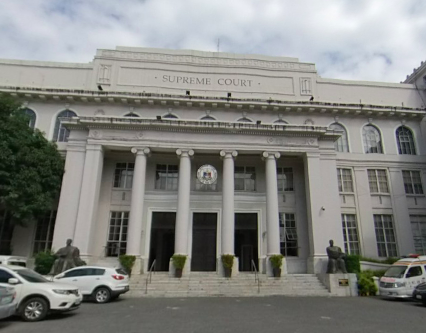‘Fair report’: SC clears Inquirer in libel case filed by Enrile
MANILA, Philippines — The Supreme Court has cleared the Philippine Daily Inquirer of the libel case filed by former Sen. Juan Ponce Enrile over his inclusion in a story about an attempted coconut levy fund compromise deal in 2001, saying the report was “certainly not libelous” and that it did not find malice on the part of the paper.
The high tribunal’s five-member First Division chaired by Chief Justice Alexander Gesmundo unanimously overturned the 2013 libel conviction handed down by the Makati Regional Trial Court (RTC) Branch 139 that was upheld by the Court of Appeals in 2016.
In a decision dated July 14 this year and penned by Associate Justice Alfredo Benjamin Caguioa, the high tribunal ruled that the Inquirer did not commit libel since the story merely reported what the Presidential Commission on Good Government (PCGG) said and since there was lack of malice.
Enrile filed a libel case against three Inquirer editors and a reporter over the Dec. 4, 2001, article, “PCGG: No to coconut levy agreement” that mentioned Enrile among the Marcos cronies who benefited from the multibillion peso coco levy fund.
The Inquirer story was based on a statement issued by the PCGG opposing the proposed settlement of the coco levy fund case.
The late PCGG Chair Haydee Yorac, however, denied giving any statement implicating Enrile, who was the defense secretary during the Marcos regime, in the coco levy fund plunder.
On Oct. 30, 2013, the Makati RTC Branch 139 convicted the late Inquirer editor in chief Leticia Jimenez-Magsanoc, former associate editor Abelardo Ulanday, former news editor Artemio Engracia and former Inquirer reporter Donna Cueto of libel.
They were ordered to pay Enrile P2.75 million in damages.
Mere replication
The Inquirer appealed the decision but the CA’s 15th Division on Aug. 22, 2016, upheld the RTC’s judgment, though it reduced the award to P1.3 million.
In its ruling, the Supreme Court said two of the four major elements of libel did not apply in the Inquirer case: the imputation of a discreditable act or condition, and existence of malice.
The high court said it was not the reporter who claimed that Enrile was a “plunderer” or a “Marcos crony” but “was merely repeating a supposed statement from PCGG Chairperson Yorac.”
“It is true that Yorac subsequently disclaimed ownership of any of such statements, but the foregoing fact did not thereby make the defamatory imputations automatically from Inquirer or [reporter] Cueto,” it said.
“The subject article was a mere replication—a plain report that ‘a person said this’—albeit inadvertently attributed to the wrong person. Hence, it is certainly not libelous,” the Supreme Court went on.
The high court also pointed out that “fair reports on matters of public interest” are included in the list of qualifiedly privileged communications that are exempt from the presumption of malice.
‘Of public interest’
It said the subject matter of the article—the coco levy funds—was “undoubtedly a matter of public interest” while Enrile himself was “unquestionably a public figure.”
“It could be indisputably inferred, therefore, that the presumption of existence of malice does not arise for the article, as the same is considered a ‘fair report on matters of public interest’ and thus a qualifiedly privileged communication,” it said.
The Supreme Court said Enrile failed to prove actual malice on the Inquirer’s part.
“What constitutes malice is not the fact that the articles contain matters which are false. For there to be malice, it must be that the articles were published with the knowledge that the matters in the article were false,” it said
“It could not be said, however, that at the time of the article’s publication on Dec. 4, 2001, that petitioners (Inquirer) already knew that the statement did not, in fact, come from Yorac,” the high tribunal stressed.
But the Supreme Court also said it would not sanction “irresponsible journalism.”
“The court declares its continued recognition of the right of every citizen to enjoy a good name and reputation. The court however is equally cognizant of the important role that the continuing guarantee of the freedom of the press serves to our nation,” it said.
